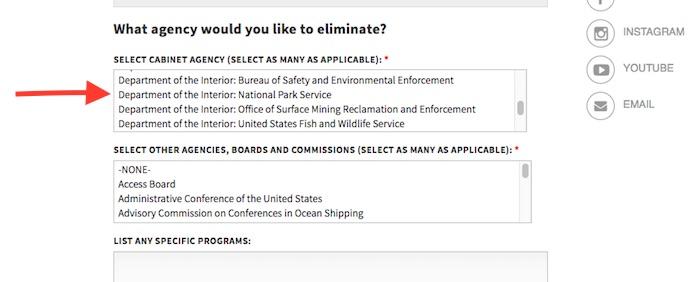
That headline, of course, asks a ridiculous question. But the Trump administration is leaving no federal agency immune from its search for ways to shrink the government.
Through June 12, you have a chance to weigh in on the future of the National Park Service. Here's how the government phrased it in a Federal Register entry tied to the government reduction effort:
The Executive Office of the President invites the public to suggest improvements to the organization and functioning of the Executive Branch. These suggestions will help inform the development of the proposed Government-wide Reform Plan, designed to create a leaner, more accountable, and more efficient government that works for the American people.
As the Traveler has noted this year (here, here and here), many national parks and National Park Service employees are strained as they try to cope with funding and staffing shortages in the face of robust growth in visitation, which reached a record 331 million in 2016. During those years of growth, park staffing has stayed stagnant or dropped, and things could get worse if the president's proposed $1.5 billion cut to the Interior Department's Fiscal Year 2018 budget is adopted by Congress.
According to an analysis by the National Parks Conservation Association, the president's budget would:
- Cut the land acquisition program that helps protect parks from development within their borders. The Land and Water Conservation Fund is critical to protecting areas within national parks from commercial and residential development and enjoys broad bipartisan support. Cutting this funding fails to recognize the program’s success as one of America’s most effective conservation tools protecting national parks and other public lands important to Americans.
- Eliminate funding for the National Heritage Area program, a $19 million program that supports historic and cultural resource preservation at sites all across the United States through innovative public-private partnerships. They include Niagara Falls National Heritage Area, which helped fund a shuttle system that has increased heritage tourism revenue throughout the Niagara region and at local historical assets like Old Fort Niagara, and Augusta Canal National Heritage Area, which finances preservation of the canal with revenue generated from a restored hydropower power plant.
- Eliminate funding for the Great Lakes Restoration Initiative, an important federal funding source that has provided $300 million annually for communities and park restoration projects in the region, is used to restore habitat for birds and fish, control invasive species, and reduce runoff from cities and farms to a improve water quality for the more than 30 million people that depend on the lakes for their drinking water.
- Eliminate the Chesapeake Bay Restoration Initiative. With more than 50 national parks in the watershed, eliminating the Chesapeake Bay Restoration Program threatens the overall health of the Chesapeake by stopping the progress made to restore native oysters, which help filter and remove pollution. These cuts would also stop the implementation of the bipartisan Chesapeake Bay Clean Water Blueprint - a historic and comprehensive pollution reduction plan for restoring clean water in the region’s streams, creeks and rivers.
- Eliminate the South Florida geographic program, which helps ensure clean water flows through Everglades National Park and Loxahatchee National Wildlife Refuge by monitoring and enforcing the pollution limit and working with the State of Florida on the Stormwater Treatment Areas, a successful state-federal partnership that has resulted in improved water quality for the Everglades.
- Eliminate opportunities for local input and environmental review of energy development near national parks and other sensitive areas. Administrative reforms such as the elimination of Planning 2.0 are already threatening the air, water, wildlife and visitor experience at iconic parks such as Zion, Mesa Verde, and Carlsbad Caverns, and further cuts to programs that facilitate a balance between energy development and park protection will only exacerbate these problems.
At the Park Service, managers are expecting to have to pull their belts even tighter in the next fiscal year. A memo sent out April 14 by James Cason for the Interior Department's deputy secretary told agency heads "to begin planning for Fiscal Year 2018 budget reductions and developing a long-term workforce reduction plan."
The memo additionally instructed that "bureaus and offices should ensure that spans of control and delegations of authority are optimized to accomplish the work with the fewest amount of management layers needed to provide for appropriate risk management, oversight, and accountability."
The public comment period for thoughts and suggestions on how the government workforce should be reorganized is June 12. You can comment on this page.



Comments
Wonder how many NPS's High Command and upper
level supervisors, voted Trump ? The fear here is
that the NPS will be negatively changed from within
by GOP's political appointees given their obvious
Disrespect for Science and Protections of Natural Area
Resources.
From experience, using Redwood NP's "Birth in
Controversy" as one example, there have been several
RNP park administrators who clearly had little interest
in understanding and defending protections of
park forest and stream resources given their primary ambitions
were promoting themselves into higher paying roles
(that is, while using their RNP experience as a mere step toward a
promotion or retirement with the highest retirement benefits)
This in stark contrast to the several key
volunteer RNP Co-Founders whose passion fighting
for RNP proposals was clearly grounded in the
Beauty and Protection of the complex coastal
redwood forest ecosystems.
Given the autocratic Trump Administration's tendencies
to promote lies and to install their own political appointees
within agencies, the NPS may be effectively
destroyed from within ! The White House Liars have been
attempting to shut down any FBI investigations into their
GOP Presidential Campaign with Russian officials.
Ironically, many of the poorer income voters
promoting/supporting Trump will be real losers in the
new budget proposals now defended by Trump.
http://www.politicususa.com/2017/01/24/trusted-trump-advisor-demands-fed...
http://www.govexec.com/pay-benefits/2017/05/trumps-2018-budget-reportedl...
There is Hope, however, that the GOP Gains will be short-lived:
http://www.cnn.com/2017/05/22/politics/virginia-poll-trump/?iid=ob_artic...